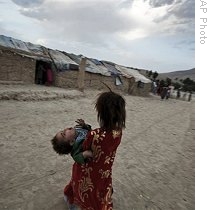Geneva
13 September 2009
The International Organization for Migration is running an 18-month project to help reintegrate thousands of returnees, internally displaced and other vulnerable groups in western Afghanistan. IOM says it is particularly critical to provide shelter and heating for tens of thousands of Afghans before the harsh winter sets in.
 |
| A young girl carries a baby at a camp for internally displaced people from Helmand province, on the outskirts of Kabul, Afghanistan (File) |
Spokeswoman for the International Organization for Migration, Jemini Pandya, says the beneficiaries would include growing numbers of Afghan deportees from Iran. She notes Iran currently hosts some 900,000 registered and as many as one million unregistered Afghan workers.
"In 2007 and 2008, Iran deported nearly 800,000 Afghans, mainly through the Islam Qala and the Zaranj border crossing points on its eastern border with Afghanistan," said Pandya. "But, between January the 1st and the 22nd May this year, a further 166,000 people had been expelled, which is actually an increase of 42 percent in the same period from last year."
Since 2002, IOM reports another 4.3 million Afghan refugees have voluntarily returned to Afghanistan. Pandya says this large number of returnees has created acute housing shortages.
It also has over-stretched infrastructure in a country that has experienced decades of conflict, instability and economic stagnation.
"About 85 percent of the average family income is now being used just to buy food to keep a family going," added Pandya. "And, high food prices and fuel prices, as well as drought have had a severe impact on the most vulnerable groups in Afghanistan, many of whom are also living in very poor and inadequate housing. The lack of housing is also a big issue, partly because of the years of conflict, which have not given us a clear idea of how many homes have actually been destroyed in Afghanistan or badly damaged. What is clear is that many people are living in very poor accommodations."
Pandya says this is exacerbating peoples' suffering during months of freezing temperatures during Afghanistan's harsh winters. She says a contribution of more than three million Euros from Italy will be used to provide winter kits, including heating fuel to vulnerable families.
She says it also will pay for shelter for homeless families, clean water and training to upgrade skills for people without jobs.